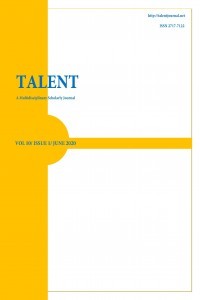Perceptions of Gifted Students Towards Distance Education in the Covid-19 Pandemic
Perceptions of Gifted Students Towards Distance Education in the Covid-19 Pandemic
This research aims to describe the impact of distance education, which is formed by a deceleration of formal education during the Covid-19 process, on gifted children. The research is patterned by the basic qualitative research method. Among the purposeful sampling methods, criteria sampling and snowball sampling methods were used as base while determining the participants. The research participants consist of the parents of the elementary school students who were diagnosed with superior ability and are present in formal education. Research data were collected by structured interview form. The data obtained were analyzed descriptively. Although the findings of the study indicate that the formal education process is more efficient, it has been observed that the curfew affects the students the most negatively. There are also views supporting that the process is beneficial in terms of socialization and self-development. Other findings are included in the research findings.
Keywords:
Covid-19, Online education, EBA Distance education, Gifted students,
___
- Anderson, T. (Ed.). (2008). The theory and practice of online learning. Athabasca University Press.
- Babbie, E. R. (2013). The basics of social research. Cengage learning.
- Bryman, A. (2016). Social research methods. UK: Oxford university press.
- Büyüköztürk, Ş., Çakmak, E. K., Akgün, Ö. E., Karadeniz, Ş., & Demirel, F. (2011). Bilimsel araştırma yöntemleri. Ankara: Pegem Akademi.
- Clark, R. C., & Mayer, R. E. (2016). E-learning and the science of instruction: Proven guidelines for consumers and designers of multimedia learning. John Wiley & Sons.
- Doidge, N. (2007). The brain that changes itself: Stories of personal triumph from the frontiers of brain science. Penguin.
- Karabulut, R. (2010). Türkiye’de üstün yetenekliler eğitiminin tarihi süreci. Yüksek Lisans Tezi. Abant İzzet Baysal Üniversitesi, Sosyal Bilimler Enstitüsü, Bolu.
- Lee, M. J., & McLoughlin, C. (2011). Web 2.0-based e-learning: Applying social informatics for tertiary teaching. Hershey, New York: Information Science Reference.
- Mayer, R. (2005). Richard E. Mayer, eds. The Cambridge handbook of multimedia learning. UK: Cambridge university press.
- Meb (2020,haziran 10). Bakan Selçuk, Koronavirüs'e Karşı Eğitim Alanında Alınan Tedbirleri Açıkladı. Erişim adresi: https://www.meb.gov.tr/bakan-selcuk-koronaviruse-karsi-egitim-alaninda-alinan-tedbirleri-acikladi/haber/20497/tr
- Moore, J. L., Dickson-Deane, C., & Galyen, K. (2011). e-Learning, online learning, and distance learning environments: Are they the same?. The Internet and Higher Education, 14(2), 129-135.
- Ömeroğlu, E. (1993). Okul Öncesinde Üstün Çocuklar ve Eğitimi. 9. YA-PA Okul
- Patton, M. Q. (2014). Qualitative research & evaluation methods: Integrating theory and practice. Sage publications.
- ISSN: 2717-7122
- Başlangıç: 2011
- Yayıncı: Anadolu Üniversitesi
